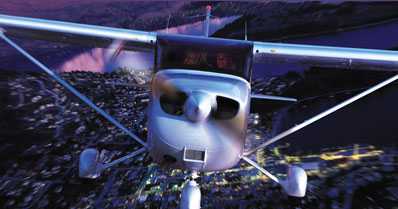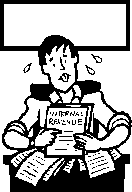Flyers Respond By Taking Their Business Elsewhere
 You may not see it if
you look in the mirror... but if you fly your small general
aviation aircraft into the state of Maine, you have a target on
your back.
You may not see it if
you look in the mirror... but if you fly your small general
aviation aircraft into the state of Maine, you have a target on
your back.
Lots of people vacation in Maine, and there are some beautiful
places to fly there but, as ANN reported, a law that
took effect on January 1, 2007 allows the state to collect a five
percent "use tax," equivalent to a sales tax, on any plane which
spends 20 days or more in the state in a year. The Aircraft Owners
and Pilots Association last year urged its members in other states
to leave their aircraft at home when they visit Maine, or just stay
away from the state entirely.
The expressed intent of the use tax was to raise $2 million in
revenue from visitors to offset a slight reduction in taxes for
state residents of the state. State tax collection officials get
the brunt of the angry responses to the tax bills, but are quick to
pass the blame to lawmakers. As David Bauer, a tax policy analyst
with Maine Revenue Services, told the Associated Press, "We're
charged with administering the law. We didn't write it."
In theory, your tax bill will be five percent of the aircraft's
value, less whatever amount you paid in sales tax in your home
state, and the use tax only applies if you fly into Maine during
the first year of ownership.
If mistakes are made, though, forget any presumption of
"innocent until proven guilty." You'll have to document your reason
for claiming an exemption in a state where you don't live, and
where you didn't buy your aircraft.
In an attempt to avoid a negative impact on aircraft service
facilities in the Maine, lawmakers exempted visits by out-of-state
pilots for maintenance and repairs. To avoid clogging the courts,
the law also exempts aircraft over 6,000 pounds... which
conveniently focuses the tax burden on small aircraft owners, who
would presumably have more difficulty affording court costs.

The AP cites the example of Steve Kahn, who lives in
Massachusetts. That state exempts aircraft purchases from its own
sales tax to provide an incentive to support the industry.
Kahn often flies his plane to visit his vacation home in
Rockland, Maine. He also serves as a pilot in the national Angel
Flight program, picking up patients in rural Maine and bringing
them to Boston-area hospitals free of charge. For his support of
Maine's economy and service to its residents, Kahn was rewarded
with a surprise, $26,000 tax bill on his airplane.
He tells the AP, "At best what Maine is doing is underhanded and
devious. At worst it is illegal. Either way, it's wrong."
Maine joins a growing list of states targeting pilots who visit
in small aircraft purchased elsewhere. Florida assesses a use tax
of six percent, less any tax paid in your home state, if you fly
into Florida even once within six months of the purchase date. The
state monitors airport ramps for transient N-numbers, and you could
receive a bill even if you stop in Florida just long enough to
refuel.
 Washington state will
hit you for up to 8.9 percent if your plane is in Washington for
more than 90 days in any continuous 12-month period. Illinois also
taxes out-of-state plane owners.
Washington state will
hit you for up to 8.9 percent if your plane is in Washington for
more than 90 days in any continuous 12-month period. Illinois also
taxes out-of-state plane owners.
Encouraged by the relatively large potential return for a small
investment of time, states are using the internet, FAA records and
random ramp checks to spot aircraft which might be targets for use
taxes. Some privacy advocates are concerned that the coming
requirement for aircraft to be equipped with ADS-B will create
something analogous to a gigantic supermarket barcode scanner,
allowing automated flight tracking for use-tax billing. FAA records
of IFR flight plans are already used in this manner by states.
Louis Meiners is the president of Advocate Aircraft Taxation
Company of Naples, FL. The consulting firm for aircraft owners has
grown to 1,600 clients nationwide. Meiners points out that a pilot
could conceivably get a separate bill from every state visited on a
cross-country flight. "What we have is a real potential for double
taxation and triple taxation and endless taxation in the way the
states try to enforce it."
As the AOPA protest suggests, it may take pilots boycotting use
tax states to bring enough pressure to resolve the problem. Some
aircraft owners are already taking action on a personal level.
Brian Cleary of Longboat Key, FL flies to Maine to tend to his
timber and property management business. He got a surprise use tax
bill for more than $175,000. He's so angry that he tells AP he has
stopped buying land and timber in Maine and will move his holdings
to New Hampshire.
 Airborne 10.14.25: Laser Threat, VeriJet BK, Duffy Threatens Problem Controllers
Airborne 10.14.25: Laser Threat, VeriJet BK, Duffy Threatens Problem Controllers Airborne 10.15.25: Phantom 3500 Confounds, Citation CJ3 Gen2 TC, True Blue Power
Airborne 10.15.25: Phantom 3500 Confounds, Citation CJ3 Gen2 TC, True Blue Power Aero-News: Quote of the Day (10.17.25)
Aero-News: Quote of the Day (10.17.25) NTSB Prelim: Piper PA-28-180
NTSB Prelim: Piper PA-28-180 ANN FAQ: Contributing To Aero-TV
ANN FAQ: Contributing To Aero-TV





